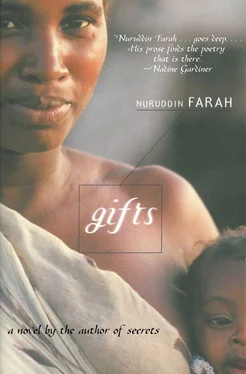Nuruddin Farah - Gifts
Здесь есть возможность читать онлайн «Nuruddin Farah - Gifts» весь текст электронной книги совершенно бесплатно (целиком полную версию без сокращений). В некоторых случаях можно слушать аудио, скачать через торрент в формате fb2 и присутствует краткое содержание. Год выпуска: 2011, Издательство: Arcade Publishing, Жанр: Современная проза, на английском языке. Описание произведения, (предисловие) а так же отзывы посетителей доступны на портале библиотеки ЛибКат.
- Название:Gifts
- Автор:
- Издательство:Arcade Publishing
- Жанр:
- Год:2011
- ISBN:нет данных
- Рейтинг книги:3 / 5. Голосов: 1
-
Избранное:Добавить в избранное
- Отзывы:
-
Ваша оценка:
- 60
- 1
- 2
- 3
- 4
- 5
Gifts: краткое содержание, описание и аннотация
Предлагаем к чтению аннотацию, описание, краткое содержание или предисловие (зависит от того, что написал сам автор книги «Gifts»). Если вы не нашли необходимую информацию о книге — напишите в комментариях, мы постараемся отыскать её.
Gifts — читать онлайн бесплатно полную книгу (весь текст) целиком
Ниже представлен текст книги, разбитый по страницам. Система сохранения места последней прочитанной страницы, позволяет с удобством читать онлайн бесплатно книгу «Gifts», без необходимости каждый раз заново искать на чём Вы остановились. Поставьте закладку, и сможете в любой момент перейти на страницу, на которой закончили чтение.
Интервал:
Закладка:
“Do you want me to show you photographs of her?” he asked.
She motioned to him to lie where he had lain before. “I don’t trust cameras as much as I trust your emotive description of her. After all, a person is not only a body, which is what photographs show.”
“That’s true,” he agreed.
She encouraged him. “How would you describe her to someone who has never met her?”
“It’s her eyes,” he said, speaking as if under hypnosis.
“What about them?”
“They are almost green.”
“Almost?”
“Like a ginger cat’s, each of Zawadi’s eyes has a slightly different tint, the left a darker green, the right one almost blue. But you have to get close enough to them to notice.”
“And neither eye is artificial?”
“No.”
“What’re her parents’ nationalities?” she asked.
“Both her parents were Afro-American.”
“But somewhere along the line, in her genes, perhaps, there is an explanation,” she said, feeling he was about to doze off. “In a place like the US, where almost everybody comes from somewhere else, there’s bound to be an explanation.”
His eyes were closed, his breathing even like a sleeper’s.
“Would her photographs, the ones you wanted me to see, have shown these differences in the colouring of her eyes?”
There was no answer. He was asleep.
“What do you reckon her reaction will be if she hears you and I are married? Do you think that will upset her? I mean, is she the kind of person who’s likely to send us a telegram of congratulations even if she were?”
When there was no reply, she disengaged her body from his. Then something snapped in her head, like a blind snapping open in a room in which dawn, like an egg, broke bright and light-hearted.
She was sad he wasn’t awake to hear the decision she had reached.
17
In which Duniya wakes up in Bosaaso’s house. Later Waaberi, his late wife’s younger sister, calls; so do Hibo and Kaahin.
A young woman intimate enough with Duniya speaks in the dream of untapped wealth to be found at the bottom of a narrow-mouthed well. Would Duniya like to jump in and appropriate it? She thinks for a long while, eventually giving in, plunging head first, brave, adventurous, untouched by fear of death or drowning. Awaiting her, Duniya finds a well-groomed orchard and at its centre a spring.
Somewhere in the house a radio was giving the morning news bulletin, in English. A raft of strange sounds reached Duniya’s drowsy sense, in weird sequences. Some of the noises were coming from the kitchen where she assumed Bosaaso was preparing breakfast; some came from the eaves, others from within her own head. She was too exhausted to determine what mysterious waves had washed her ashore, depositing her on such an alien beach. Before taking stock of the externals surrounding her, she listened to the 7 o’clock news:
It has been announced at a press conference that the US government is donating to Somalia 30 million dollars’ worth of aid for three programmes. The first is under the heading The Northwestern Region Reconstruction and Rehabilitation Programme and to this the sum of $12 million has been allocated; the second (to which about $5.5 million has been allocated) is to help ameliorate the overall condition of people from the region which has suffered a civil war; while the third programme comprises reconstruction of all the infrastructure that the war in the area has destroyed.
Thinking: this was no civil war, there was a massacre in the Northern Region of innocent civilians, a will-o’-the-wisp drone deafened Duniya with the suddenness of a shock It was not so much a din of noises, more the loudness of ugly colours. The colours of the curtains in the room in which she woke, in which she and Bosaaso had made love, clashed with its wall, those of the walls with the ceiling, and the ceiling’s with the doors and window Perhaps it was unfair to pass judgement on other people’s taste. In any case, which of the two was responsible: Bosaaso or Yussur? Upon whom would she lay the full blame? And what were the reasons for making these choices? Being of a generous turn of mind, she decided that maybe a number of people’s tastes had been accommodated here. But how could he wake in a room like this every morning? The curtain material had a plastic look and feel; the wallpaper was fresh green, bright yellow, flowery, showy. Was it because Bosaaso was a man and so had the enormous capacity to postpone dealing with a domestic problem until some woman came in to tackle it?
It was just as well the lights were off the night before. Would she have stayed, made love and slept here if she had seen all this ugliness? Not likely, although she might have suggested they go to the city flat. Looking up now, she saw a spider spinning the fibre of its own fable. She remembered the warmth of Bosaaso’s body, exuding heat much like a radiator.
He slept on his back, right hand placed on his left, both hands resting on his breast, as if performing devout prayers. A smile embellished his lips, his breathing inaudible, his whole body straight, not a bend anywhere. In the body-politic of sleep, he was a handsome man to watch.
Taariq, Duniya reminded herself, used to take up more than his fair share of the bed, and Zubair fell asleep in a tortured posture, like a child whom drowsiness called on in the middle of a convulsive cry. Mataan slept with his mouth half open; wickedly Nasiiba had once splashed a couple of drops of water into it. Could the poor girl have known that in some areas of the Middle East one poured cold water into people’s mouths when they died in the belief that this would facilitate their passage to heaven? On the other hand, asleep, Nasiiba’s right hand remained half closed in the attitude of someone awaiting something to hold, whereas the fingers of her left hand would be doubled into a fist as if clutching a childhood treasure, a fist compact as a clove of garlic. Yarey would shed all her clothing when asleep, her legs open in a posture Nasiiba would describe as rebellious, not obscene.
She heard quiet footsteps on the stone stairs. Then Bosaaso’s head appeared through the door.
“Good morning,” he said, his face expanding with a new smile.
“Good morning.”
“Did you sleep well?” he asked, his hands resting on her belly as his whole body prostrated with the pleasure of giving her a kiss. “And did you dream sweet dreams?”
“I was too exhausted,” she lied.
He sat on the edge of the bed and took her hand in his. “I’ve made an assortment of breakfasts, not knowing what you might like. I realized that it’s our first morning together.”
“It is,” she said.
His words were like fresh-cut flowers. He had showered and shaved. His teeth looked whiter than ever as he said, “Would you like me to bring your breakfast up here or would you prefer to come down and have it with me?”
“What’s the time?” she said.
“It’s almost eight.”
The world of sleep engulfed her like a fog. “I’d like to shower first,” she said.
He got up to bring her a towel, opening the cupboard near the window. Then she saw the contrast between his plainness and humble cast of mind and the plastic discomfiture of the furnishings of the room. It was a comfort to let her gaze dwell on him. He was wearing locally-made khaki trousers, a collarless shirt of maraykaan- cotton and sandals. He walked back to her with the deference of a waiter.
“If you like, I can go out while you’re in the shower, call at the flat in the city centre, collect the key from the cleaning women, pay them off, run other errands like telegraphing New York, if it’s possible, and then come back?” he said.
Читать дальшеИнтервал:
Закладка:
Похожие книги на «Gifts»
Представляем Вашему вниманию похожие книги на «Gifts» списком для выбора. Мы отобрали схожую по названию и смыслу литературу в надежде предоставить читателям больше вариантов отыскать новые, интересные, ещё непрочитанные произведения.
Обсуждение, отзывы о книге «Gifts» и просто собственные мнения читателей. Оставьте ваши комментарии, напишите, что Вы думаете о произведении, его смысле или главных героях. Укажите что конкретно понравилось, а что нет, и почему Вы так считаете.











